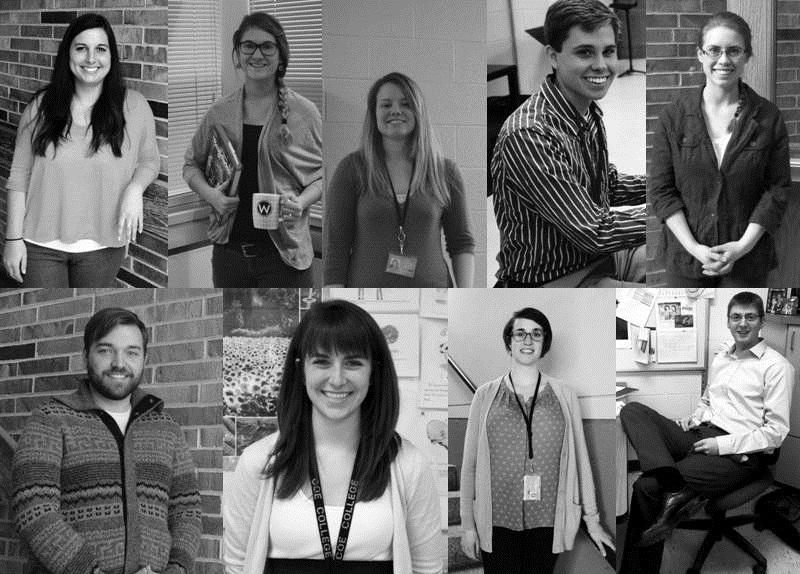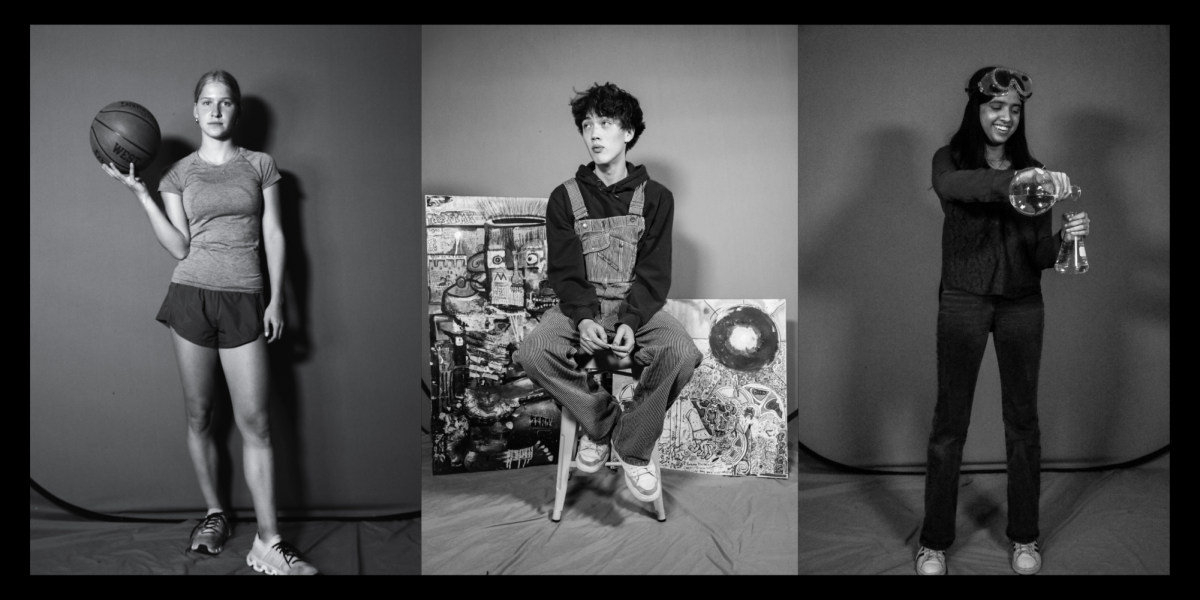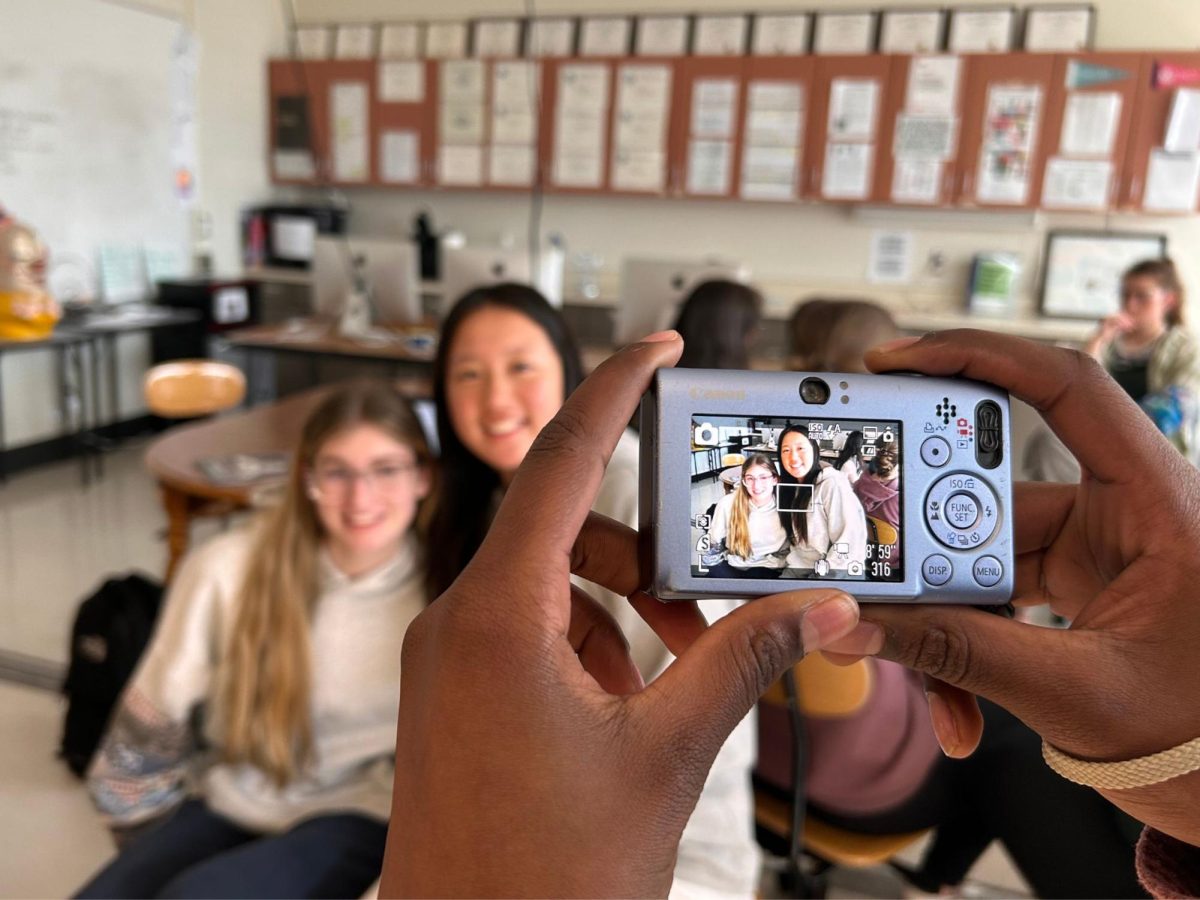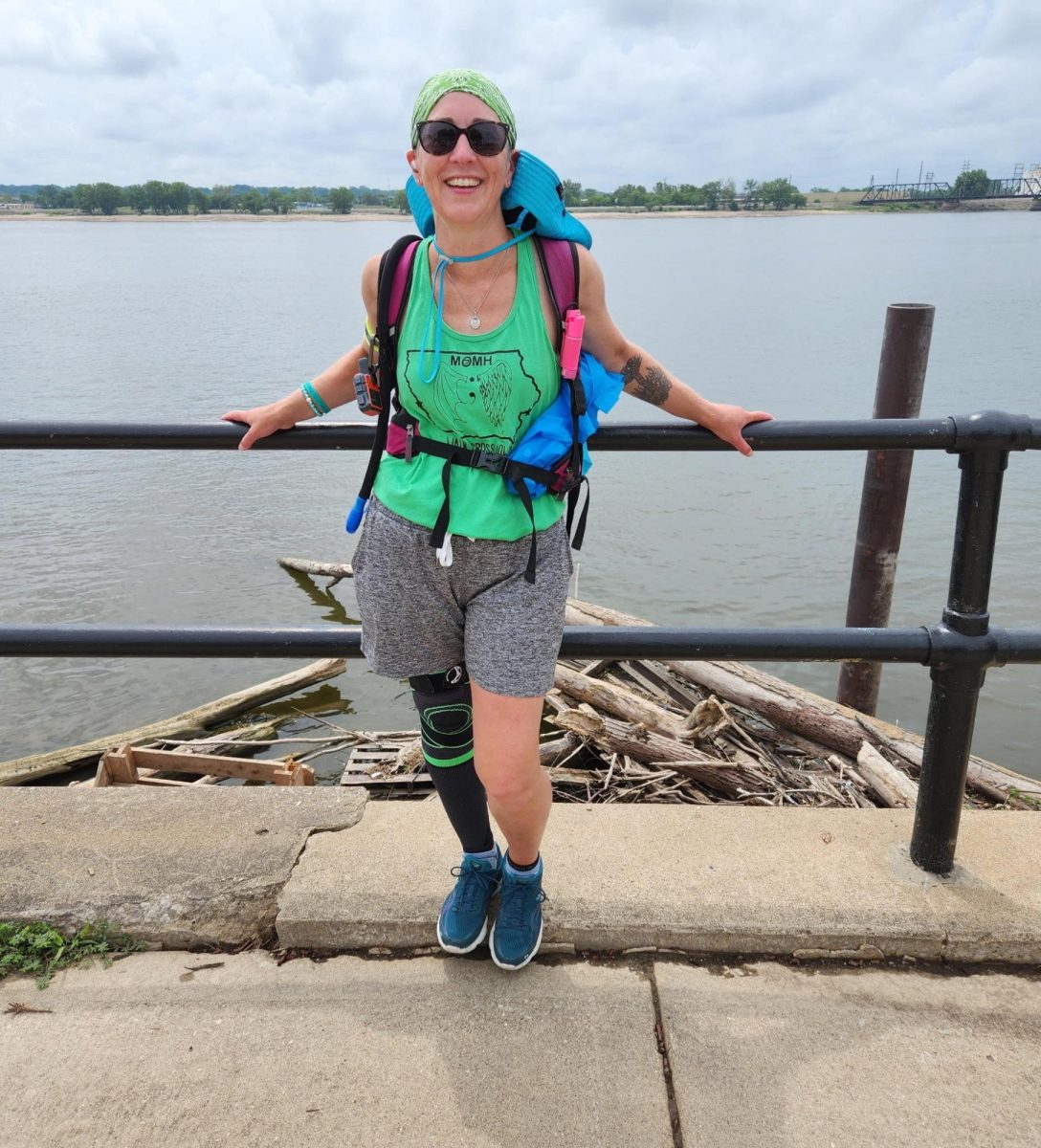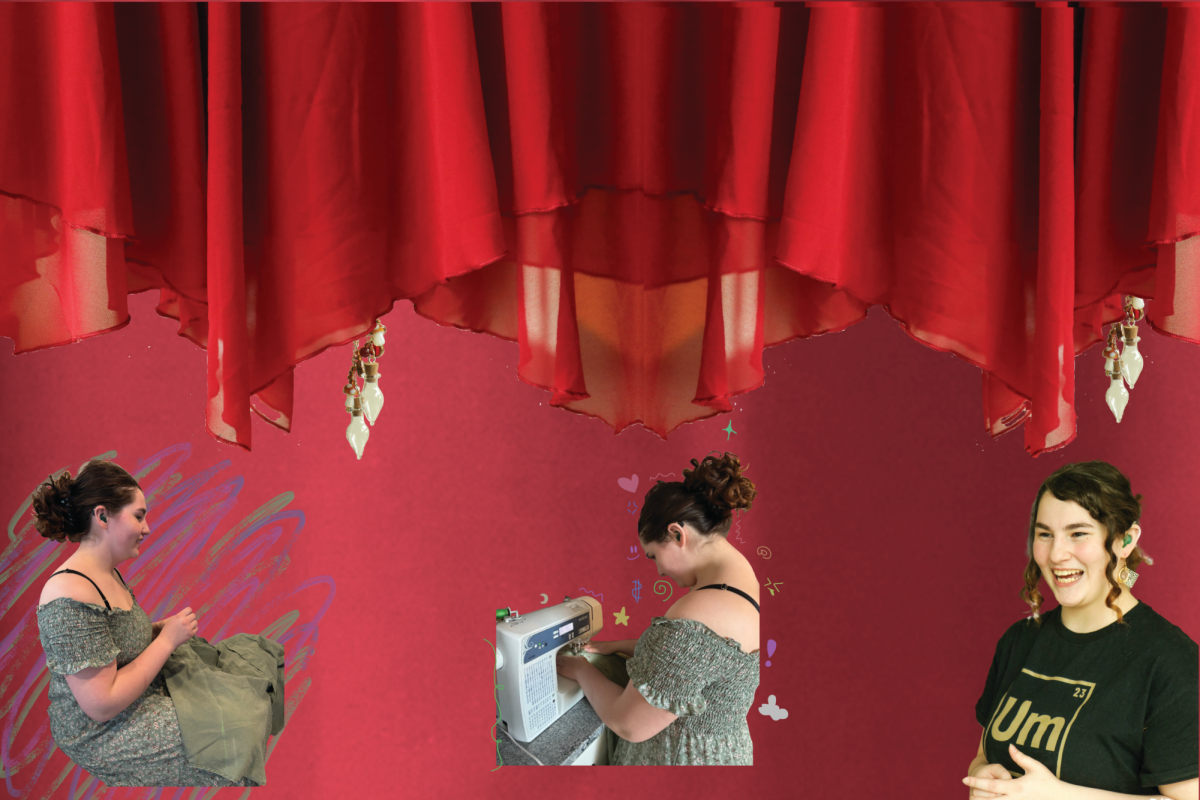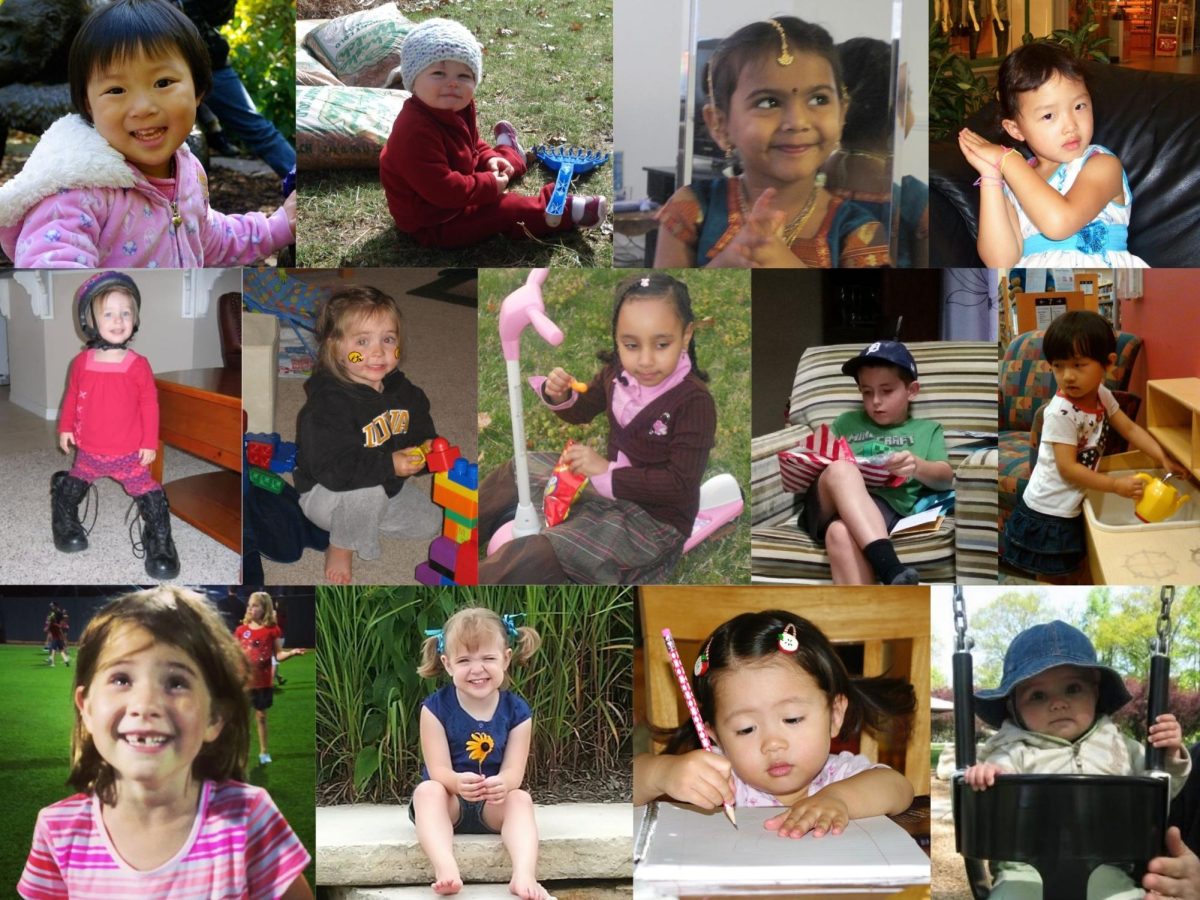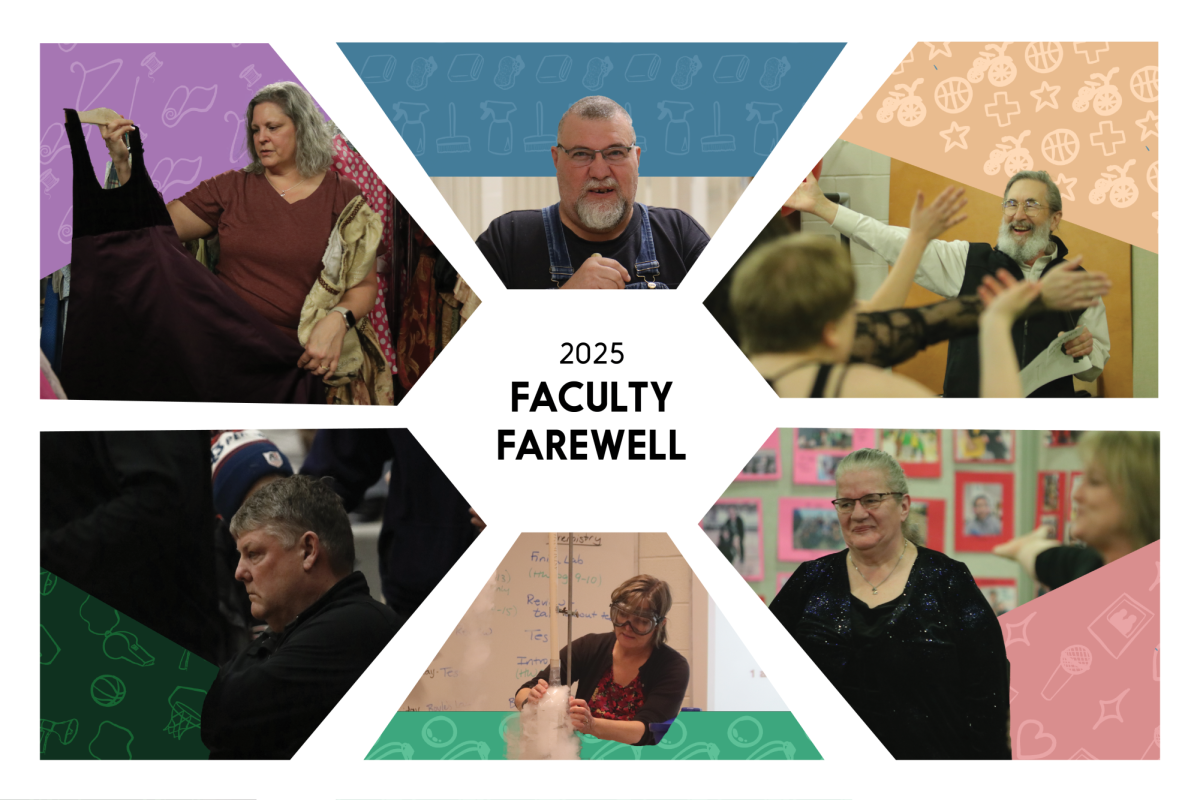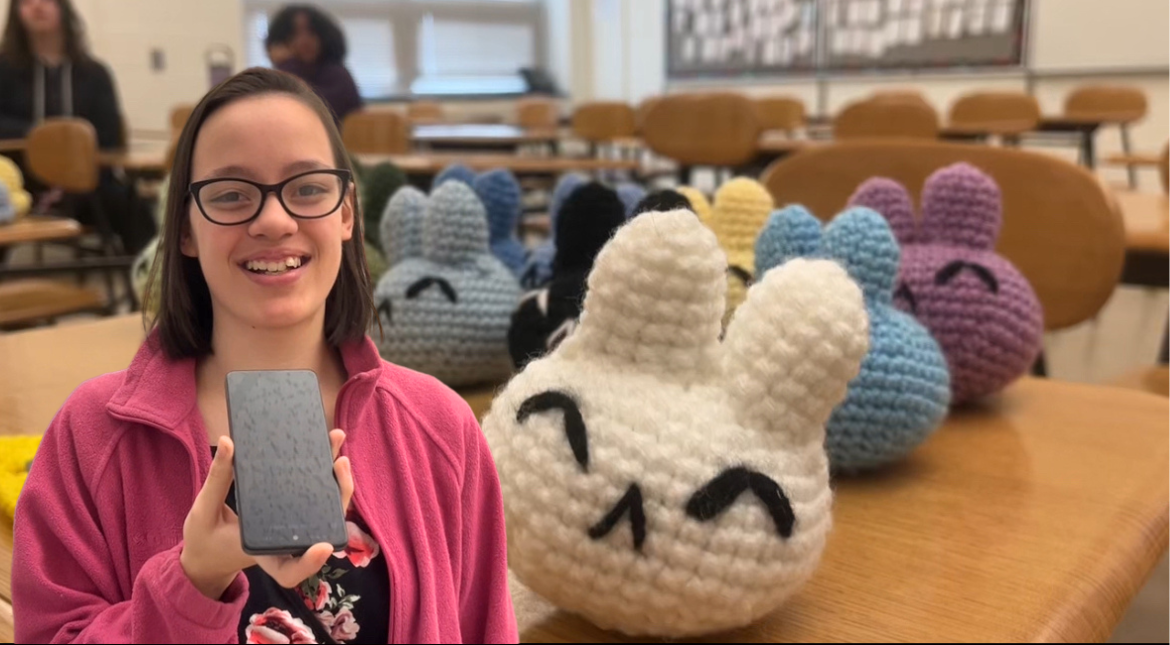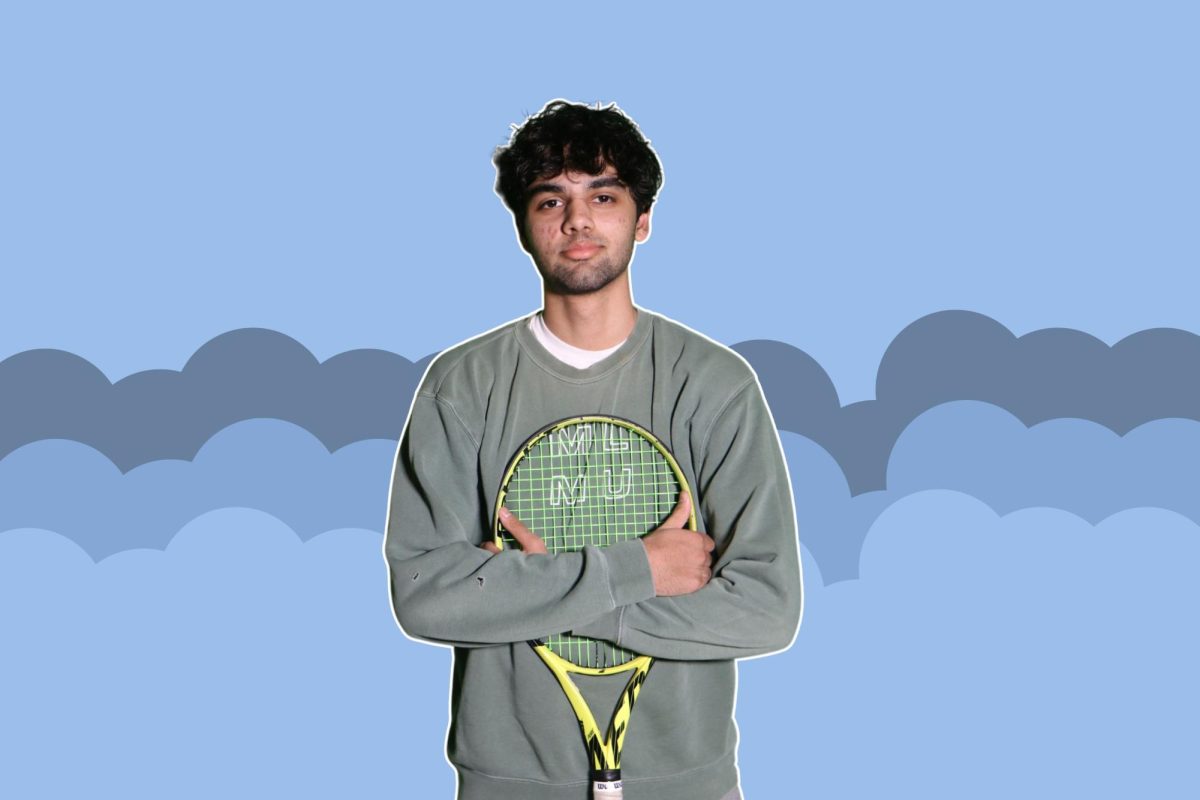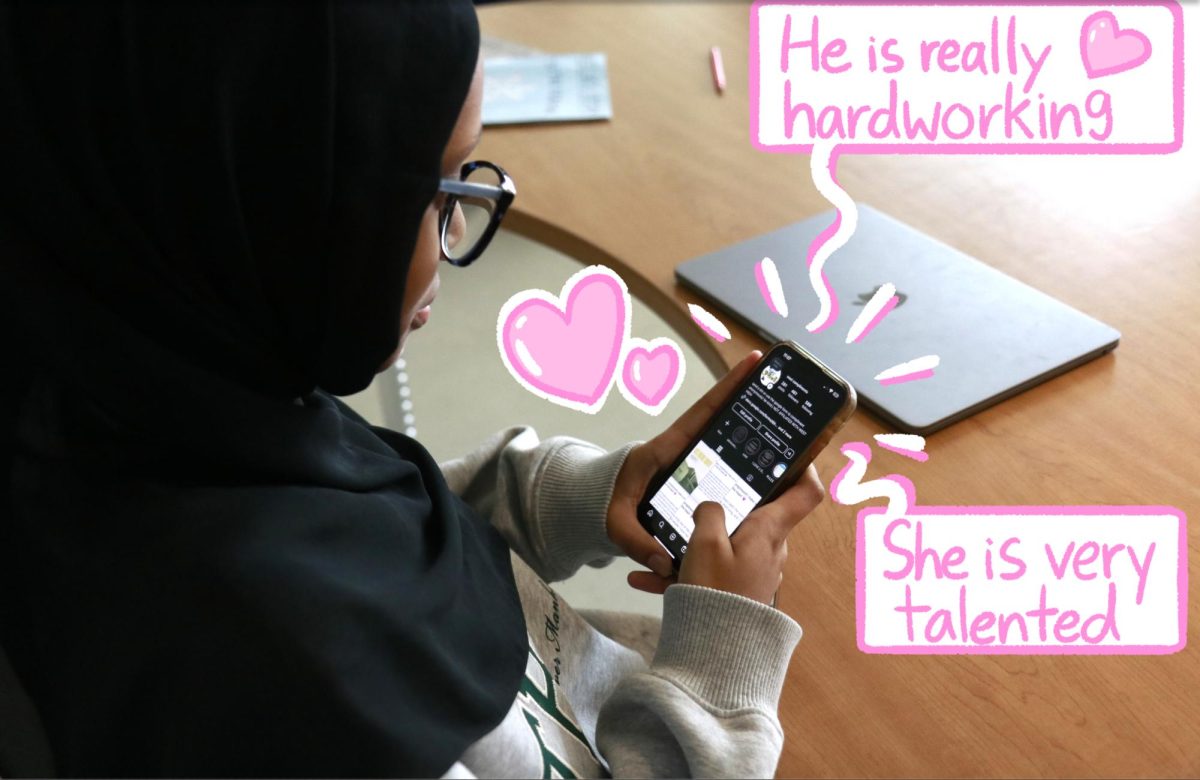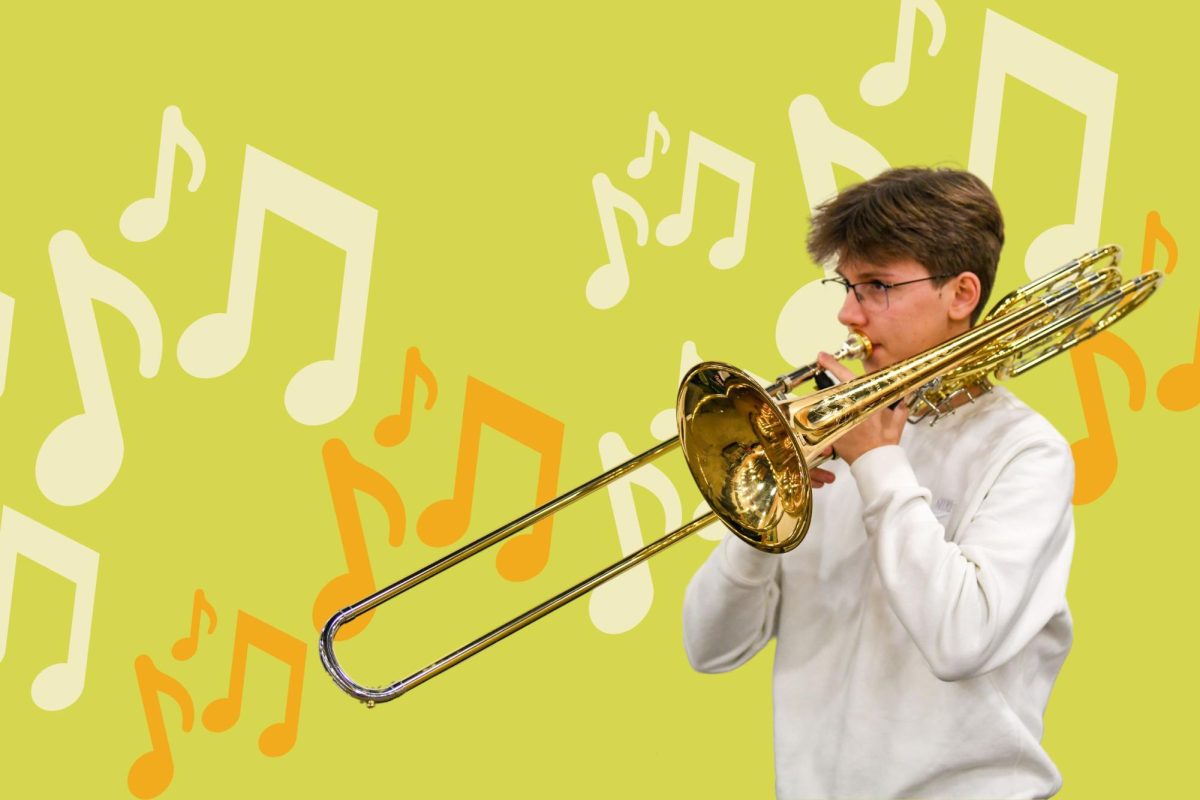Photos by Nick Deerberg and Gage Van Dyke
Joe Sloma-Student Teacher for Kerri Barnhouse
By Gage Van Dyke
For Joe Sloma, pursuing a degree in English wasn’t the first option. After trying out a business major, Sloma quickly realized that path was not something he was necessarily passionate for.
“I was a business major for 2 weeks. It was the easiest decision to quit that, ever. After that I was undecided for awhile. I actually worked at ACT in Iowa City, grading student essays. That was the teaching spark,” Sloma said.
Sloma was a kid when he realized he liked to write; an attempt that was successful not in its completion, but in its beginning of Sloma’s love for writing.
“I read Harry Potter and the Lord of the Rings as I was growing up. I tried to write a novel when I was in middle school. I mean I didn’t make it that far, but I had a few dozen pages of chicken scratch involving time travel in the Medieval era, and war and monsters and elves. I’m not into that stuff anymore but I guess you could say that was the germination period of my writing,” Sloma said.
Sloma still writes, but not as frequent as he would like. For Sloma, a jumbled mind caters to his spontaneous ideas and a collection of partial passages from short stories.
“I don’t write as much as I should, but I like to write fiction [and] creative non fiction sometimes. I’m one of those people who once they write a paragraph of a short story they get a new idea and then end up having ten incomprehensible blurbs,” Sloma said. Sloma doesn’t worry about drawing idea diagrams and story webs; instead, he works from impulsivity. “I have a disorganized mind, so it would be hard to map out something creatively. Usually things I like that I write come spontaneously,” he said.
Writing wasn’t the only creative outlet Sloma had as a kid. In high school, Sloma was a guitarist for a band he and his friends created.
“I was in a band, I played guitar in a garage band. Our name was “Strawberry Tuesday”. It was because our school had strawberry milkshakes on Tuesdays that everybody liked. We only put the band together for one show. It was nothing professional, we just sang cover songs from the 90s.”
Amelia Stuhr, Student Teacher for Ann Rocarek
By Gage Van Dyke
Born in Waterloo, Iowa and graduated from Ankeny High School, Amelia Stuhr’s passion for teaching was prevalent at a young age.
“I used to watch Big Comfy Couch. It was this really creepy girl with big curly hair who sat on this couch, and underneath the cushions she’d pull something out. She had reading time, so she’d pull out her books and read to the audience. I used to pretend to be that girl and hide books under my couch cushions and then I’d read to my imaginary classroom. I think that was my defining teaching moment,” Stuhr said.
In high school, Stuhr applied her leadership and aiding qualities to her high school program which focused on working with students who needed more attention and company along with their school work.
“I did Big Brothers and Big Sisters in high school. It’s a mentoring program where you’re set up with a buddy. Mine was in 1st grade. You spend one day a week with them at an after-school program, and so I did homework with them. I loved that and I came to Iowa City and did it too,” Stuhr said.
For Stuhr, the age gap between her and her students provides certain challenges that since beginning student teaching West, she’s learned to handle.
“It’s hard coming back to a high school, just because I was in high school 4 years ago, [and] to switch from being a student to being a professional and demanding respect. But I do connect with my students more. The first month was kind of hard just to find that balance, but now I’ve found it, and I like it a lot. I just feel like I was in high school a year ago,” Stuhr said.
Bradley Beale, Student Teacher for Ryan Person
By Gage Van Dyke
“In junior high all the boys said that their mom was making them do it, but I never had that.”
Before collegiate choir and student teaching, Bradley Beale was in show choir in junior high for two years and for four years in high school, when he attended Wheaton Warrenville South High.
When Beale auditioned for show choir in his high school, the experience was exasperating.
“I sang ‘Empty Chairs and Empty Tables’ which was too low, even to this day. I remember leaving callbacks saying ‘that is the hardest thing I’ve done,’” Beale said. Beale attended Luther College in Decorah, Iowa and partook in the Nordic Choir there. After his last official concert at the college, Beale was already on his way to Iowa City. “I had my last Nordic concert where I had to leave my friends and move. The next day I was teaching,” Beale said.
Beale didn’t know what to expect coming into student teaching, but from the first day choir teacher Ryan Person was giving Beale opportunities to interact musically with West Singers, one of West High’s premiere choirs.
“Mr. Person has made my life eight-thousand times better. On the first day I was doing warm-ups. They gave me a lot of opportunities. They, and the students, acknowledge what I am doing. Reassurance helps a lot,” Beale said.
Kendra Wisely, Student Teacher for Dave McNair
By Kelsey Keranen
Kendra Wisely, a current student at Cornell College, although clearly passionate about teaching the Spanish language, is ready to try anything.
Wisely, with one more class to take before her schooling and time as a student teacher is complete, says that currently the future seems a little intimidating.
“Right now is the scariest time of my life. I’m almost done with school, I graduate in May, and it’s about time for me to step out into the real world – I need to get a job, I need to support myself. I have no idea where I’m going to be in a few months,” she said.
Wisely’s own life has proven to be a series of unexpected events, which she says has given her the ability to take life as it comes.
“Over winter break this year, I got the opportunity to travel to the Virgin Islands to go try out for their national soccer team. That’s something unexpected that just popped up in my life that’s pretty exciting,” Wisely said. “The experiences, like randomly getting invited to try out for the national team and accepting it without hesitation has showed me that life can throw you curveballs and that’s not a bad thing. Sometimes it’s okay to say yes to things even if you don’t know what’s going to come out of it.”
Despite the inevitable fear that comes with the encroaching and unpredictable future, Wisely feels she is prepared for whatever cards she’s dealt.
“Whatever choice I make, I’m not scared it’s going to be the wrong one because even if it’s hard I will learn something from it,” she said.
Emily Jones, Student Teacher for Tom Lindsey
By Kelsey Keranen
For Emily Jones, a current English student at the University of Iowa, her love of English was always apparent, but seemed unattainable from her high school perspective.
“In high school I always thought about writing books, and I liked the idea of writing for a TV show, but these were just crazy off-the-wall ideas because I went to a small school and didn’t know anyone who went off to do things like that. I forgot about these creative outlets and chose to do something like chemistry, something that I’d find more jobs in,” she said.
Inspiration for her career choice was heavily influenced by her creative writing teachers in high school and college and Jones’ mother.
“A few years ago, my mom had a lot of health complications. That was a scary time because I was afraid she was going to pass away. That was scary, but she’s doing a lot better now,” Jones said. “My mom has always been an inspirational person to me. She always said I was going to do good things no matter what I ended up doing. She was a teacher, so I had that background and was introduced to the school setting. I guess that’s also what inspired me to become a teacher.”
The experience, Jones says, has made her anticipate a teaching position.
“This experience has definitely made me more excited to be an English teacher. I love getting to know the students, and I know I’ll have fun with making my classes exciting and trying to find projects that will be interesting for students to do.”
Heidi Heaton, Student Teacher for Theresa Juhl
By Kelsey Keranen
Heidi Heaton, a current student at Coe College in Cedar Rapids, Iowa, is gracing the French curriculum with her upbeat attitude and love for the French language.
While the foreign language students at West were gallivanting across Europe, Heaton took on the full-time position as French teacher for Madame Juhl’s French classes. Although taking on student teaching for four different language levels may seem a daunting task, Heaton isn’t easily rattled by the wide variation of French-speaking students.
“I think they all have different challenges – French II definitely because they’re younger students who are starting with the language, and they have a different kind of energy – AP poses other challenges, but speaking in French all the time is fun for conversation.”
Heaton’s past experiences in France have given her insight as to how to adjust to and handle the classroom environment.
“I was able to teach students 10 and 11 years old English at a French school, and I still keep all of those contacts with these students and teachers, and we email back and forth in French,” she said.
In addition, some offbeat aspects of her life have proven to further aid her in learning how to handle a vast array of students.
“I have about 100 first cousins – my mom is one of nine kids and my dad is one of fifteen, so I have a lot of cousins and a really big family, so I’m really good with names,” she said.
The experience at West, Heaton says, has ultimately made her look forward to a future teaching position.
Julia Alba, Student Teacher for Jeff Finn
By Kelsey Keranen
Julie Alba, an English student at Cornell College, is bringing firsthand educational experience and a passion for classroom diversity to the classes at West High.
“I was really fortunate growing up because I was born and raised in France and went to a public school there,” Alba said. The school system there is very rigid, and when my mother got a job at a small, artsy, independent school in San Francisco, I was able to go there free of tuition and that made a huge difference in terms of the kind of education I was able to get. I think that allowed me to become much more well-rounded in terms of what I’m able to do, rather than just math, science, and English.”
Although much of her inspiration is derived from her school experience, Alba says her life choices and drive to consider life from an outsider’s perspective was borne from a tragic moment in her past.
“My father passed away a couple years ago, which was very difficult to deal with. I was trying to figure out, how does this shape me as a person – how do I make this not ruin me as a human being? I think that was a scary kind of process to go through, but you grow,” Alba said.
This was not only a learning process for Alba, but it gave her new light as to how to handle the issues of those whom she associates with, especially students.
“The fact that I went through that helps me to remain mindful. When a student is performing poorly in school I don’t just automatically go for oh they’re a slacker, I have the ability to think ‘oh, there might be something going on,’ because they’re individual people with lives outside the classroom, they’re not just students.”
Her time at West, Alba says, has heightened her excitement for becoming an educator.
“I was really nervous at first, because this was the point when you realized whether or not you really want to be a teacher, but as soon as I started doing it and having so much fun with all of the kids and coming up with curriculum and projects, I definitely knew: this is it.”
Lauren DiGorgio, Student Teacher for Rich Medd
By Lushia Anson
Every morning, the West High band room fills up with sound, each instrument adding a unique layer to the music. Student teacher Lauren DiGiorgio mounts the podium, ready for another day of perfecting pieces and bringing the band together through music.
DiGiorgio’s passion for teaching band stems not only from her love of music but from the atmosphere of community that results from making music together.
“There are so many different reasons why people are in band … no matter what, they come together as a community,” she said.
Drawing inspiration from her band teachers in school who helped foster her passion for music, DiGiorgio is currently working to get an Iowa Teaching License as well as a B.A. in bassoon performance at the University of Iowa. She currently is working with West band director Rob Medd and Northwest Junior High band director Kevin Brown.
“They’re so supportive of me and their students … they really are a model of what an excellent teacher is,” DiGiorgio said. She also praised teachers Rich Medd and Jane Triplett for being “willing to go the extra mile to help me.”
DiGiorgio started to play the flute in her school band when she was in fifth grade, but when her middle school band instructor switched her to bassoon, “I fell in love,” she said.
It wasn’t until her junior year of high school, when DiGiorgio started teaching private flute and bassoon lessons to middle-school students, that she realized her passion for teaching.
“I loved when they got excited about it,” she said. “I quickly realized that I should do this.”
DiGiorgio describes her proudest teaching moments as situations where she will be working one-on-one with a student and suddenly something will “click.” She can’t help but smile when she describes a recent moment she had with a 7th grade trombone player who was having trouble with a scale. DiGiorgio suggested that he break the scale down and practice more slowly, and after the student had ran it through a couple of times, he was able to play the scale and felt empowered, wanting to apply the method to all his scales.
It is those moments that are the most rewarding for DiGiorgio.
“The student’s face lights up and they get really excited about the music,” DiGiorgio said.
Grace Swehla, Student Teacher for Jon Bach
By Stephon Berry
Grace Swehla is a dwarf star primed to go supernova in whichever school is lucky enough to receive her, but as you watch her traversing the trials of student teaching an AP class you’d never imagine the adventures and stories that rest in such a petite frame.
Having been born into a military family Swehla has seen more of the world as a minor than most senior citizens see over the course of their entire life, “I was born in Ames, Iowa. From there I moved to Connecticut then California, and then Japan,” Swehla recounted “When I lived in Japan we were able to visit China, New Zealand, and the Micronesian Islands.”
One of the major differences between Asian and North American culture swehla recounts is Asia’s disregard for that personal bubble we as Americans are so fond of, “Just think about it, one of the many reasons people rushed to America was for freeland, you could have your own space.” Swehla said, ” There are no places like Montana in Asia or Europe where there’s open space for miles around.”
She theorizes that this is why Europeans and Asians are so much more comfortable with one another, “In Japan it’s totally acceptable to sleep on your neighbors shoulders while you’re riding the train.”
This sense of comfort is something she also recalls from her time spent in Europe. “In Germany they value that open space. So if they board a train and notice that one side is empty they’ll sit next to someone in order to preserve that open space, I think that’s something to be admired.” Swehla said ” In America we try and put as much space between us and the next person as possible.”
This was a very subtle yet major difference between the two cultures.
” In America we tend to take what we can get, whereas in Europe they take what they need.” Swehla still sees merit in both of these approaches. ” As an American I’m most comfortable with my little bubble, but there’s definitely something to be said about a culture where you can trust others not to take advantage of you while you sleep on their shoulder.”
Travis Henderson, Student Teacher for Brady Shutt
By Megumi Kitamoto
It can be difficult to be in a completely new environment. For Travis Henderson, coaching debate at West for seven years made the process of finding a mentor flow much more smoothly.
“I had friends in the [social studies] department, and my good friend Megan [Johnson, social studies teacher and fellow debate coach] asked Mr. Shutt if I could student teach,” Henderson said.
However, pursuing a career in education was not his original intention.
“I had considered going into law before, but in ninth grade we went to go talk to elementary school kids. Afterwards, my English teacher asked me if I had ever considered a career in teaching after she had seen me with the kids. That [experience] planted the seed in me,” Henderson said.
Now, he student teaches under social studies teacher Brady Shutt while taking classes for his master’s degree in education at the University of Iowa at the same time.
“When I graduate, I will be certified to teach in social studies, and it interests me because it is so meaningful to how we interact,” Henderson said.
Another very important aspect of Henderson’s life is debate.
“When I started at Valley [High School in West Des Moines], I was looking for something challenging, so I joined the team through the recommendation of a friend. After debating through high school, I knew that I want to keep on doing [debate] because it is so intellectually competitive,” Henderson said.
Henderson has continued debate, but as a coach. Although he has previously coached at Dowling Catholic High School and Iowa City High School, he believes that debate is very different at West.
“The level of administrative support for debate is really high, and my debaters are really great, because it’s really easy to think that competition is the most important thing [in debate], but they have a sense that competitions are a lot of fun,” Henderson said.
Participating in debate has helped him improve as a teacher.
“Debate has made me more intelligent and articulate speaker, but debate is centered on complicated arguments, which makes it pretty difficult to know where students are at. Because of debate, I also used to believe that a more competitive environment was more beneficial for learning, but that was quickly changed after a while,” Henderson said.


